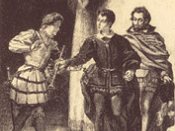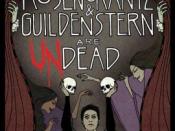[Opening Theme Music]
David Brauer: Good evening. I'm David Brauer and this is today's episode of 'The Arts in Review.' Today we will be discussing the topic of 'Transformation or merely imitation?' by focusing on William Shakespeare's Hamlet and Tom Stoppard's 1967 adaptation Rosencrantz and Guildenstern are Dead, henceforth referred to as Ros and Guil. We have here today two special guests - Dr. Johnson, renowned English lecturer from the University of Melbourne, and Tom Stoppard himself.
So tell me, didn't the Elizabethans in Shakespeare's age have religious beliefs? But when Mr. Stoppard wrote his play, God only existed amongst a minority. Is this not a transformation in context?
Johnson: Yes it is David. In Shakespeare's era, the Christian church was an active participant in all areas of social and political life. God, death and the afterlife were never questioned. Hamlet is on the cusp of two ways of thinking - his medieval beliefs are conflicting with new Renaissance principles, however there is no doubt of his Christian faith.
Stoppard: I wrote Ros and Guil in the 20th century, was a more sceptical time than Shakespeare's, where things were what they seemed and there was no deep metaphysical pondering of one's future, and God had been declared "dead." With the threat of nuclear war came new ways of questioning our existence, exposing man's fundamental confusion of the world. Ros and Guil often convey this confusion throughout the play.
Hamlet's world had been very conscious of the spiritual, and I believe I transformed this to a rather existentialist worldview that was prevalent in society during the time I wrote Ros and Guil.
David: So you're saying Hamlet's world had God to maintain order, whilst this order no longer exists in Ros and Guil due to the "God is dead"...


